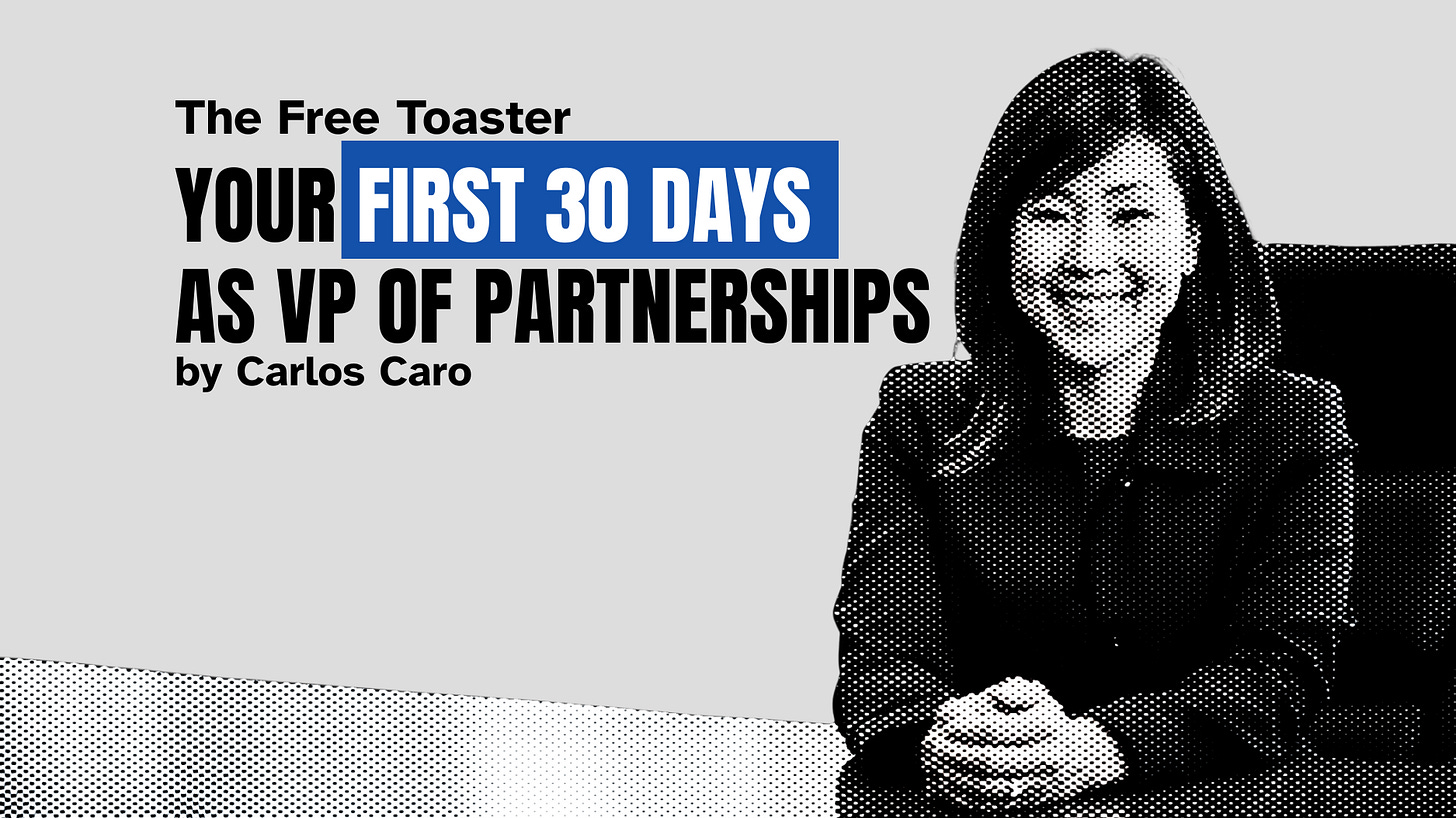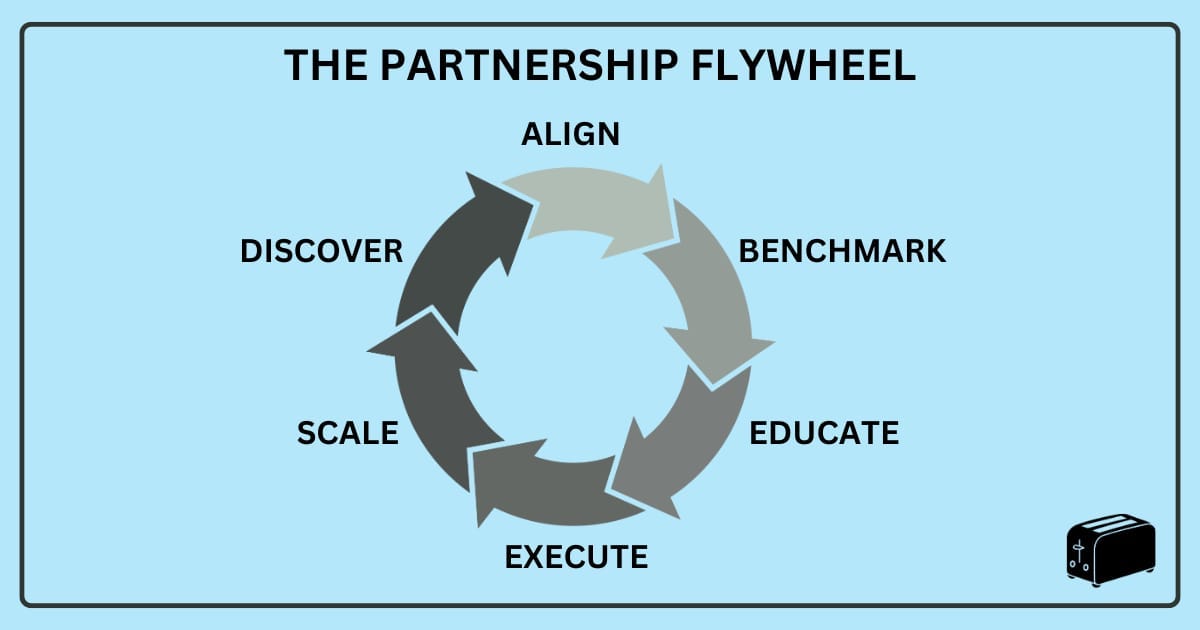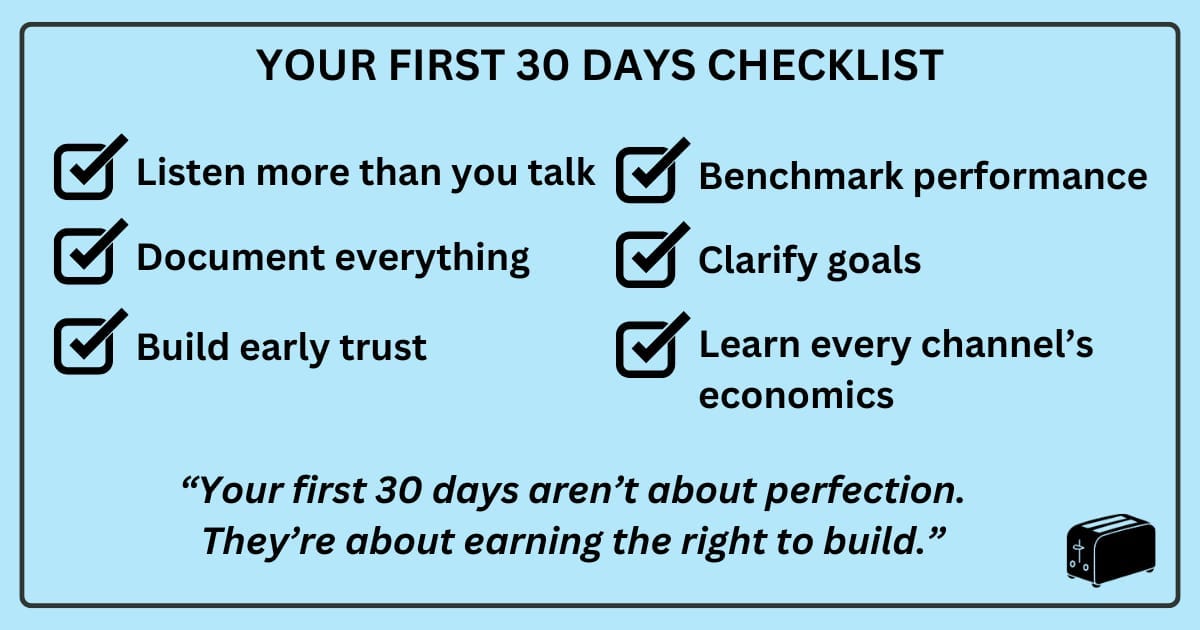Your First 30 Days as VP of Partnerships
Why doing your homework is better than running around "closing deals"
There's a moment that happens in every new VP of Partnerships role, usually around day three.
You're sitting in your seventh onboarding meeting. Someone is walking you through a Tableau dashboard that hasn't been overhauled since Q2 2024. The sales team just promised a partner something that product says is "technically impossible." And you realize: Oh. This is why they hired me.
Not because everything was running smoothly and they needed someone to maintain the excellence. Because something wasn’t quite working, and they needed someone who knew how to take it to the next level.
Here's the thing nobody tells you: This is actually a great scenario for you (professionally)!
Your first 30 days aren't about pretending everything is fine. They're about earning the credibility to have a strong voice at the executive level.
And that's genuinely exciting if you're the kind of person who gets energized by seeing the direct impact of your work on a company’s results.
Here’s how I think about those crucial first weeks.
The partnership leader’s growth flywheel starts spinning once clarity replaces chaos.
Hopping On Planes
Here's what makes a great partnership leader different from someone who's just filling a seat: You're going to see things that everyone else has stopped noticing.
Step 1? Go visit every major partner in person within the first 4 weeks.
You're going to sit across from your counterpart at LendingTree or NerdWallet, and they're going to tell you things that nobody internally knows. Maybe your API has been timing out and costing them millions. Maybe your predecessor promised features that never shipped. Maybe there's a competitor integration they love that you could learn from.
These conversations aren't uncomfortable truths to dread – they're opportunities to uncover that nobody else has. Every problem a partner shares is a problem you now have permission to solve.
You're not walking into these meetings to defend the past. You're there to build the future. And partners can feel that difference. They'll open up to you in ways they never would to someone who's been around long enough to be defensive about the status quo.
Building Your Internal Alliance
The same principle applies internally.
Step 2? Go have coffee with everyone who works on partnerships. That includes account managers, product managers, engineers, credit analysts.
The PM who's been screaming into the void about impossible promises? They just found an ally. Your analytics person who knows the attribution is broken but couldn't get anyone to react? You’re there to take notes. That sales rep who's frustrated that product never seems to deliver? You're going to be the bridge.
What looks like organizational dysfunction from the outside is actually a room full of smart people who've been waiting for someone to connect the dots. They know what's broken. They've been living with it. They just needed someone with the authority and credibility to communicate it clearly and with conviction to the C-level, so that the right actions get prioritized.
Every one of those conversations is someone you're adding to your alliance. Document everything, yes – but also recognize that you're building relationships with the people who are going to help you succeed.
External Benchmarking As A Foundation
Let's talk about benchmarking, because this is where things get concrete and real.
Some lending companies are operating on vibes. "We're competitive." "We're in the mix." "We're doing okay."
You're about to replace that fog with clarity. Your market share in every marketplace. Your click-through rates versus competitors. Your approval rates, funding rates, every step of the funnel side by side against the competition.
What you discover might be humbling.
Maybe your CTR is half the category average. Maybe your approval rate is trailing. But here's the flip side: Now you know exactly what to fix and how much it matters.
A 2% CTR when the category average is 5% isn't a condemnation – it's a roadmap. Fix your positioning (or pricing) and you could double your volume. That's not a problem; that's an opportunity with a dollar sign on it that you can use to prioritize resources.
The benchmarking exercise gives you something rare in partnerships: clarity about what winning actually looks like. You'll know exactly where you're punching above your weight and where you're leaving money on the table.
That's important because the organization at large is unlikely to just “take your word” for it. Showing hard data on what success looks like makes a big difference.
Your Most Important Relationship
The relationship-building with credit and pricing teams is one of those pieces of advice that sounds like corporate politics.
But the reality is that these teams have more control over your success than you do.
Credit teams are optimizing for risk, maybe yield, and rarely top-line volumes. And often they don't have visibility into how their work impacts the top of the funnel and overall acquisition volume.
You're about to give them that visibility.
Show them how pricing, eligibility, and credit model alignment impacts volumes from the various marketplaces.
The pricing team don't always appreciate that being 50 basis points higher than your competitor means you disappear from the first page of results. You can show them that.
These aren't battles to win. They're relationships to build. And when you build them early – before you need a favor, before there's a crisis – you're creating a foundation for the kind of cross-functional collaboration that fuels great partnership programs.
So, About Those Volume Goals You Got On Day 1
The volume goals you inherited might have been made up by someone who Googled "aggressive growth rate" and added 40% to last year's number. That's okay.
You're not going to pretend these fantasy numbers are achievable, but you're also not going to walk in on day one and tell everyone they're wrong. Instead, you're going to build something better: a bottom-up model grounded in actual TAM, realistic market share assumptions, and real funnel metrics.
This is your chance to reset expectations with credibility.
Around day 30, when you've done the benchmarking and built the relationships and gathered the data, you can have a very different conversation. One based on numbers that everyone can rally around because they’re rooted in reality and the laws of physics of the marketplaces you’re competing in.
This isn't lowering the bar.
It's replacing fictional targets with achievable ones, then systematically beating them. That's how you build momentum.
You’ll Be A Student Of Direct Marketing, Too
You did your homework and got smart about the dynamics of the marketplaces you’ll be competing in.
Now get grounded in what your CFO is looking at - how your direct marketing channels are performing.
When someone asks – "Why are we paying LendingTree $40 per lead when we can get leads from Facebook for $20?" – it isn’t a trap. It's an opportunity to educate.
You're going to learn these channels cold. Not to copy them, but to articulate why partnerships are different and valuable. Facebook gives you a look at different audiences with different levels of intent. You’ll want to compare and contrast all the details, lead quality, CPC, CPL, CAC, and LTV across channels comfortably in an executive setting.
This requires more homework and probably a good relationship with a Director Of Performance marketing who can show you the ropes of their operation.
When you can speak the language of CAC and LTV and cohort analysis fluently, you're not just defending partnerships – you're helping the whole company understand how channels work together. That's the kind of strategic thinking that gets you invited to bigger conversations, and sets you up to have a bigger impact in your role.
What Success Looks Like
So what does a great first 30 days actually deliver?
You haven't closed massive new partnerships or doubled your volume. But you've done something more valuable: You've built a foundation for sustainable success.
You know exactly where you're winning and losing. You've identified the highest-leverage fixes. You've built relationships with everyone who matters. You've established credibility by replacing comforting fictions with uncomfortable facts. You've created an alliance of people who are excited to help you succeed.
And here's the beautiful part: All those problems you've documented?
They're not indictments. They're your roadmap.
Every broken process, every misaligned incentive, every missed opportunity – that's why you're here. That's why they hired someone with your experience and skills.
Think about the alternative for a second.
What if you showed up and started onboarding new partners in a silo?
The most likely outcome is that you would have overpromised to the partner, and created a bunch of commitments internally that the team wasn’t ready to support. In that world, you just created a bigger mess that you’ll eventually need to clean up.
Skip all of that.
Do your homework first, set the foundations for the relationships you need, and then build on a steady foundation. It feels “slower”, but it actually gets you the growth you need WAY faster.
Support The Free Toaster
Need an affiliate marketing platform/network? Chat with Fintel Connect
Need help hiring key roles? Email Connie Buehler and mention TOASTER
Need to improve application page conversions? Chat with Spinwheel
Need to accelerate your affiliate marketing? Chat with New Market Growth
Need to win on other growth channels? Chat with FIAT Growth
None of the above? Share our Newsletter in your favorite Slack channel
About Us
Welcome to The Free Toaster! The newsletter for marketing pros at fintechs, banks, and lenders.
Inspired by the free toasters banks used to give to each new customer, we’re here to help you acquire more customers at scale. We deliver fresh news, data, and insights to help you acquire more customers, minus the breadcrumbs.
Want to follow the authors on social media?
Carlos Caro is the founder of NMG, an agency that helps lenders build affiliate programs.
Nick Madrid is the co-founder of Ghostmode, a media company that builds Newsletters, Podcasts, and communities in high-value B2B niches.






